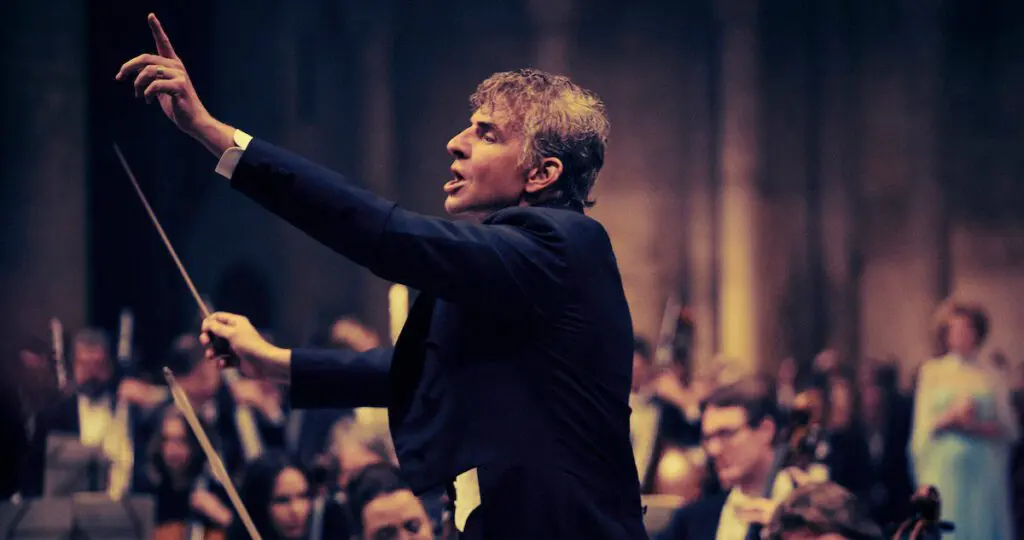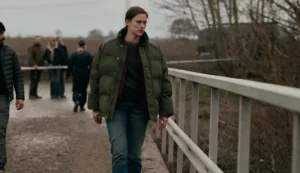Maestro (2023) is a wonderful biographical drama with an ending that comes full circle, examining the relationship of American composer Leonard Bernstein to both music and his muse — his wife Felicia. The film begins with an inscription from the writings of Leonard Bernstein stating, “A work of art does not answer questions, it provokes them, and its essential meaning is in the tension between the contradictory answers,” and it’s a simple but powerful quote that resonates right through to the end.
The first scene shows Bernstein as an old man playing a modern classical piano while being filmed and interviewed at home – a cigarette burning in an ashtray at his side. Once finished, he takes a drag and starts talking about his wife Felicia, and her impact on him.
Maestro (2023) Ending Explained
Throughout the film, we watch as their relationship bloomed and blossomed, not without its troubles and dramas. We see their passion for one another, but Bernstein’s passion for music and other lovers comes first in a lot of situations. They both find relative success in their careers, and Leonard’s trajectory to becoming a master in the music world is far faster than his wife’s. This causes Leonard’s ego to grow in dangerous ways and he starts to openly explore his sexual desires — which starts to cause a major rift in his marriage.
Felicia gets tired of playing second fiddle to both his music and his lovers, while Leonard believes that her frustrations stem from jealousy.
How does Maestro end?
Towards the end, they spend some time apart, and eventually reconcile, but then are forced to deal with Felcia’s terminal breast cancer diagnosis. Then are some gut-wrenching scenes that show how hard it was for Felicia towards the end, with Leonard by her side.
Maestro ends coming full circle, back to the beginning, with Leonard realizing how impactful Felicia was for him during an interview.
The ending is somber — Leonard’s wife, his muse, and the mother of his children, has died, painfully, after they reconciled and he might have changed his ways. However, he doesn’t, and we’re shown that his music continues — that music and art were and always will be his main purpose in life. Through subtle hints in Cooper’s excellent acting, we can see and feel that he didn’t realize how important and how impactful Felicia was until it was too late.
What happens to Leonard?
After Felicia dies, the film cuts to years later with Leonard still working in music, teaching college students. He’s showing off, flirting with admirers, clubbing with his students, being raunchy, and showing that he’s not changed since her death (not that he was ever going to), and perhaps realizing his own life is fleeting.
With the film ending where it started, with Leonard playing the piano and being filmed and interviewed, it’s safe to say he’s still showing off and being a star, but here the focus isn’t on himself or his music, but his wife. The woman who inspired him and had a bigger impact on his life and work than he realized.
Perhaps to alleviate his guilt for his affairs, he’s giving her credit and limelight, and telling those who will listen how great she was.
Is Maestro based on a true story?
This film is a biographical drama about Leonard Bernstein’s biopic, and many audiences may be curious about his true story and relationship with his wife, Felicia. Whilst it is based on the life of Leonard Bernstein, who worked as a conductor, composer, pianist, music educator, author, and humanitarian, the film has many dramatized sections for dramatic and storytelling purposes. The conversations will be fictionalized but could be very well inspired by Bernstein’s personal letters that were published in the 600-page 2013 anthology titled The Leonard Bernstein Letters.
The film depicts the truth, that Bernstein was married to Felicia Montealegre, a Costa Rican TV actress, for 26 years, and details sections of their life together, including their three children Jamie, Alexander, and Nina.
From historians, the film accurately depicts how Bernstein was passionate about both conducting and composing, As a composer, his most significant contribution was the 1957 Broadway hit West Side Story. It also displays his bisexual nature, and his affairs with men before marrying his wife.
Bernstein’s children even allowed Bradley Cooper to film scenes in the family’s country house in Fairfield, Connecticut. Cooper borrowed the legendary conductor’s bathrobe to wear in the movie, and Carey wore one of the mother’s dresses.
What did you think of the ending of Maestro (2023)? Comment below.
RELATED: Is Bradley Cooper really playing the piano in Maestro?




